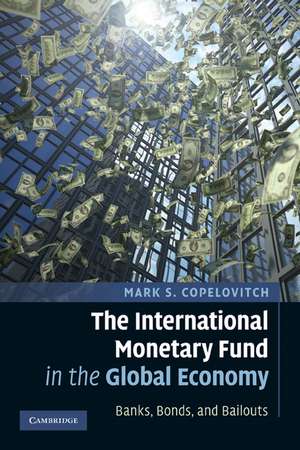The International Monetary Fund in the Global Economy: Banks, Bonds, and Bailouts
Autor Mark S. Copelovitchen Limba Engleză Paperback – 9 iun 2010
Preț: 326.92 lei
Nou
Puncte Express: 490
Preț estimativ în valută:
62.55€ • 65.49$ • 51.76£
62.55€ • 65.49$ • 51.76£
Carte tipărită la comandă
Livrare economică 07-21 aprilie
Preluare comenzi: 021 569.72.76
Specificații
ISBN-13: 9780521143585
ISBN-10: 0521143586
Pagini: 394
Ilustrații: 2 b/w illus. 16 tables
Dimensiuni: 152 x 228 x 18 mm
Greutate: 0.64 kg
Editura: Cambridge University Press
Colecția Cambridge University Press
Locul publicării:Cambridge, United Kingdom
ISBN-10: 0521143586
Pagini: 394
Ilustrații: 2 b/w illus. 16 tables
Dimensiuni: 152 x 228 x 18 mm
Greutate: 0.64 kg
Editura: Cambridge University Press
Colecția Cambridge University Press
Locul publicării:Cambridge, United Kingdom
Cuprins
1. The International Monetary Fund in the global economy; 2. Global finance and the politics of IMF lending: theory; 3. Global finance and the politics of IMF lending: evidence; 4. Global finance and IMF lending to Mexico, 1983–1995; 5. Global finance and IMF lending to South Korea, 1983–1997; 6. Conclusions.
Recenzii
'The International Monetary Fund (IMF) is one of the world's most important economic institutions, especially in times of crisis. Yet we lack a full understanding of how and why it operates as it does, and in particular of the political forces that affect it. In The International Monetary Fund in the Global Economy, Mark Copelovitch makes the case that the IMF's behavior responds to the interests represented by the major financial powers, as well as to the goals of the IMF's professional staff. Copelovitch presents a series of clear-headed, theoretically grounded arguments, then subjects them to empirical assessment. He analyzes an original database of 197 IMF programs over twenty years, and then provides two extensive country studies, of IMF relations with Mexico and Korea in the 1980s and 1990s. Both the statistical analysis and the detailed narratives provide compelling evidence for Copelovitch's political economy arguments. The International Monetary Fund in the Global Economy is a careful, persuasive application of the ideas and methods of modern political economy to a crucially important topic. It will be of interest to any serious scholar or student of international political economy, international relations, and international economics.' Jeffry Frieden, Harvard
'This is an outstanding piece of political science that combines richly detailed case studies based on primary documents with impressive quantitative results. Copelovitch argues convincingly that banks heavily influence IMF lending, but their influence depends on the composition of capital flows and the consistency of the interests of the major powers.' Randall Stone, University of Rochester
'This book represents a major contribution to the growing literature on the IMF and, more generally, to the understanding of the political economy of international organizations. Using an original 'common agency' perspective, Mark Copelovitch presents an innovative way to address decision-making at the international financial institutions, which is driven both by the major shareholder governments and by the bureaucratic staff of these organizations. Copelovitch shows that both the intensity and the heterogeneity of the preferences of the IMF's major shareholders determine whether a country will receive favorable treatment from the institution. The book furthermore shows that the nature of IMF lending has changed because of major historical shifts in patterns of international financing from concentrated sovereign bank lending to decentralized portfolio investment and bank lending to the private sector. The greater collective action problems generated by these new forms of international finance force the IMF to make larger loans with more extensive conditionality in order to reassure global markets. Copelovitch substantiates his theoretical claims with both sophisticated statistical analysis and detailed case studies. This is a must-read for both scholars of international political economy and policy-makers interested in the IMF's evolving role in the global financial system.' James Raymond Vreeland, Georgetown University and author of The IMF and Economic Development
'This is an outstanding piece of political science that combines richly detailed case studies based on primary documents with impressive quantitative results. Copelovitch argues convincingly that banks heavily influence IMF lending, but their influence depends on the composition of capital flows and the consistency of the interests of the major powers.' Randall Stone, University of Rochester
'This book represents a major contribution to the growing literature on the IMF and, more generally, to the understanding of the political economy of international organizations. Using an original 'common agency' perspective, Mark Copelovitch presents an innovative way to address decision-making at the international financial institutions, which is driven both by the major shareholder governments and by the bureaucratic staff of these organizations. Copelovitch shows that both the intensity and the heterogeneity of the preferences of the IMF's major shareholders determine whether a country will receive favorable treatment from the institution. The book furthermore shows that the nature of IMF lending has changed because of major historical shifts in patterns of international financing from concentrated sovereign bank lending to decentralized portfolio investment and bank lending to the private sector. The greater collective action problems generated by these new forms of international finance force the IMF to make larger loans with more extensive conditionality in order to reassure global markets. Copelovitch substantiates his theoretical claims with both sophisticated statistical analysis and detailed case studies. This is a must-read for both scholars of international political economy and policy-makers interested in the IMF's evolving role in the global financial system.' James Raymond Vreeland, Georgetown University and author of The IMF and Economic Development
Notă biografică
Descriere
Explains the policies and decisions of the International Monetary Fund (IMF) in the context of changes in the global economy.











